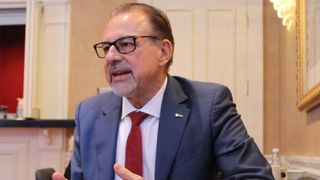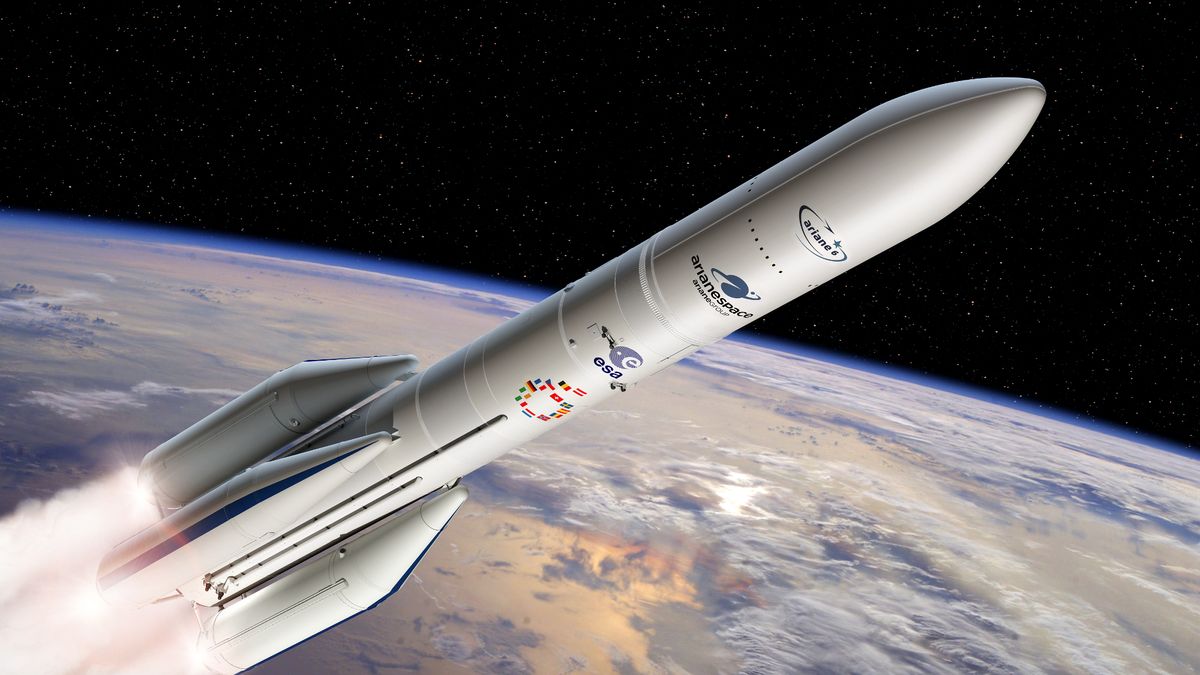Shaping an ambitious and stable space agenda for Europe requires not only diplomatic self-confidence, but also a solid foundation in science and technology. These features are indeed a must-have when working with the 22 member states of the European Space Agency (ESA).
Josef Aschbacher is Director General of ESA and will take up that role in March 2021. He is responsible for the development of Europe’s space infrastructure rockets and spacecraft that perform Earth observation, navigation, and telecommunications tasks for robotic planetary exploration, as well as the ESA astronauts flying aboard the International Space Station.
“It’s magical to put it all together, and it’s a lot of work,” Aschbacher said. The challenges are many, he added. For example, he is working to ensure that Europe has independent access to space – a crucial need for member states.
Space.com caught up with Aschbacher this month at the Space Foundation’s 39th Space Symposium in Colorado Springs, Colorado, to discuss what’s in store for the ESA. The following interview has been shortened.
Related: European Space Agency: Facts and information

Space.com: In July 2023, the venerable Ariane 5 roared into the sky and reached retirement status. But that launch was also a signal of what you saw when Europe found itself in a launch crisis. How do you deal with that difficult situation?
Josef Aschbacher: We had quite a few challenges. The industry took the lead Ariane 6 with ESA as system architect, the customer. When I became Director General of ESA, my first act was to establish: where are we? The news was not good. I had to reconfigure teams to work on the technical aspects and reconfigure the team spirit among the partners, between CNES, the French Space Agency, Arianespace and ESA. Hundreds of people were involved in various technical teams and subgroups. We systematically go through the milestones.
Space.com: And the result?
Aschbacher: We had to come together and work as a team. Thanks to the task force and the tiger teams who test and solve problems. I literally spent 60-70% of my time on launchers, so a huge amount of time to get this right. We are now on the right track, with Ariane 6 now scheduled between mid-June and the end of July.
Space.com: What matters to you in the big ESA picture?
Aschbacher: I think what we have to do – and it is a huge challenge – is to make sure that our governance works well. That is to say, the role of ESA, the European Union, our Member States, that we are not too fragmented, that we are aligned and that our assets are well aligned. On paper it should be easy. In practice it is sometimes a bit more complicated. But I’m very committed to making it work.
Space.com: Next year you will attend the ministerial meeting of the ESA Council, where policy guidelines for the European space program will be set. What does it currently look like?
Aschbacher: There are many budget problems everywhere. We are doing well in Europe, but it will be difficult. We are already starting to prepare the first elements for the ministerial meeting next November. With our 22 Member States, some states may or may not subscribe to projects. It is quite diverse and we do not know how much the ministers will commit themselves.
My job is to negotiate and prepare for a portfolio of, for example, thirty programs. So it is a year and a half of preparation. It is always high tension. Very intensive activity. At the beginning of a day and a half of a ministerial meeting, I don’t know how the day will end. I have not seen any other organization in the world that has such a funding system.
Related: NASA will get $25.4 billion from the White House’s 2025 budget request
Space.com: One area that haunts everyone is the continued growth, proliferation and daunting problem of orbital debris. ESA has made progress with a ‘Zero Debris Charter’. Why, and what is behind that initiative?
Aschbacher: We have been working on the waste problem for years. We have an active space security office at the European Space Operations Center [ESOC] in Germany. We are active and have established a Zero Debris Charter initiative. Those who sign up must commit to doing so at the end of their lives satellitethey will deorbit that spacecraft.
It’s like entering a national park. You bring in your lunch box and after you have eaten, you take the lunch box and trash outside to ensure that the park remains clean. And this is what we want to do with jobs around the Soil.
A satellite that operates for ten years must be removed from orbit at the end of its lifespan. Those who sign up must commit to doing so.
Space.com: And what do you do for ESA?
Aschbacher: I did this for ESA and instructed my engineers that our satellites now being built must adhere to this principle. Using an active de-orbiting mechanism, provide the fuel to de-orbit. They must ensure that when the satellite breaks up, it breaks into pieces small enough to burn up in the atmosphere. Nothing falls on the surface of the earth. So this is now in place within ESA.
But of course I would like others to join as well. We put it up for signing and have two signing events planned this year, one in May and one in June. One for European partners, one for international partners.
To date, we have already registered approximately 100 signatures – a mix of private companies and organizations, space agencies and public entities.
Space.com: Ink is cheap. Who’s keeping an eye on them?
Aschbacher: The charter is a statement of intent, but not legally binding. I am not a regulatory body; I’m a space agency. I want to create awareness, bring the point to the attention of the politicians. I want to be a champion of sustainability in space and I hope that others will follow suit and recognize the importance of this issue.
Space.com: Did NASA sign the charter?
Aschbacher: I have a meeting here and I will ask the question.
Space.com: There was a recent event where a battery-carrying pallet from the International Space Station was purposely discarded for re-entry into space. the Earth’s atmosphere. It then turns out to be a piece of that object hit a house in Florida. Who is responsible for that incident?
Aschbacher: There are some rules based on international law, the responsibility of the launching state and the responsibility of the operator. I would say there is a bit of a weak legal regime. I think it will be difficult to enforce this in court. But there is some foreunderstanding of who would be in charge, or an initial point of where to go in case something happens. It’s not for me to comment. I’m not a lawyer. This is really something that lawyers should look into. There will be a discussion.
Related: Kessler syndrome and the space debris problem

Space.com: Branching out into deep space exploration: how is ESA’s ExoMars project moving forward?
Aschbacher: ExoMars started around 2010-2011, with NASA originally as a partner. But budget problems forced NASA to drop out. So cooperation with Russia progressed by about ten years. Due to the war in Ukraine and the sanctions imposed on Russia by our Member States, I was unable to complete the program. And this is something very drastic. The ExoMars rover was completed and ready for launch in September 2022. The war started in February 2022, so I stopped and has ended cooperation with Russia.
We had to completely reconfigure the largely European mission, now with a very significant but smaller contribution from NASA. They provide three elements: the radioisotope heating unit that Europe does not have, the brake motors needed for landing, and the launcher. NASA supports ExoMars and we appreciate that strong collaboration. We plan to launch in 2028.
Space.com: How important is ExoMars in our study of the Red Planet?
Aschbacher: It drills into the surface, which is quite unique. There’s no chance find life on the surface. You have to go down, and exobiologists say at least 1.5 meters [4.9 feet]and we go down 2 meters [6.6 feet]. Can you imagine how exciting this will be? Imagine finding some living microbes and analyzing whether there is DNA or no DNA. Would the DNA be similar to ours or not? Unbelievable – and we just don’t know.
